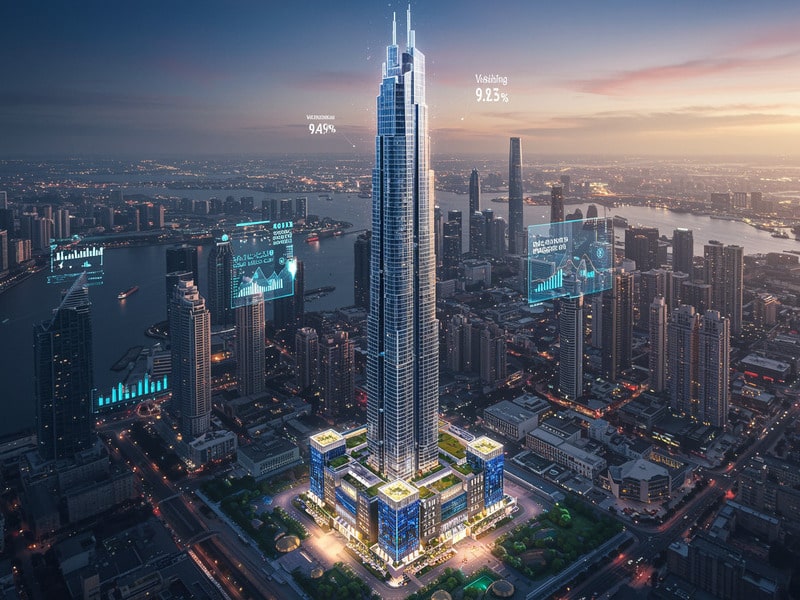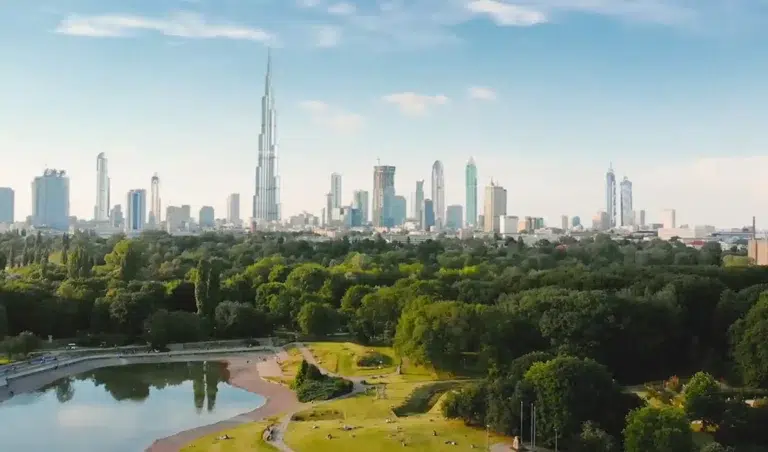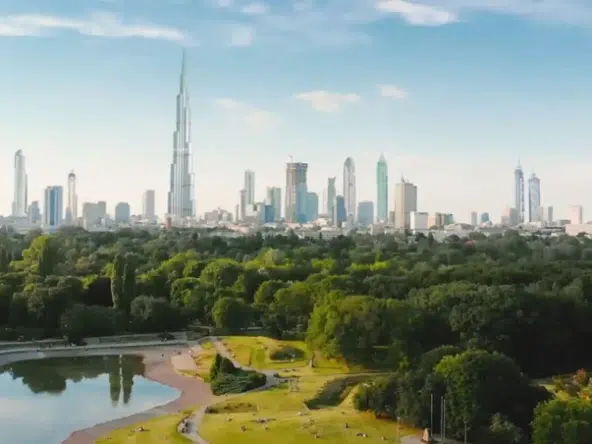Dubai is Building the Future—Own a Piece of It
Dubai has always been at the forefront of innovation, and its latest venture into the world of real estate tokenization is no exception. The city is leveraging blockchain technology to tokenize real estate assets, making it easier for investors to buy, sell, and trade property shares. Dubai is the first city in the Middle East to digitize property title deeds using blockchain technology, highlighting its leadership and innovative approach in real estate tokenization. This initiative is supported by a clear regulatory roadmap established by the Dubai Land Department and the Virtual Assets Regulatory Authority. This legal framework ensures that the concept of fractional ownership is protected under law and complies with global standards, contributing to the overall security and investor confidence in the tokenization process. By 2033, tokenized real estate is expected to account for nearly 7% of all property transactions, signifying its significant impact on the market and the overall economic contribution to Dubai’s real estate sector. Unlike traditional property, tokenized real estate offers enhanced ownership flexibility, faster transaction speeds, and greater accessibility for a wider range of investors. Real estate tokenization is not just a trend but a significant transformation in property investment.
If you are a first-time buyer looking to purchase an apartment in Downtown Dubai, check out this comprehensive guide: First-Time Buyer – How to Buy a Home in Dubai in 2025.
Introduction to Tokenized Assets
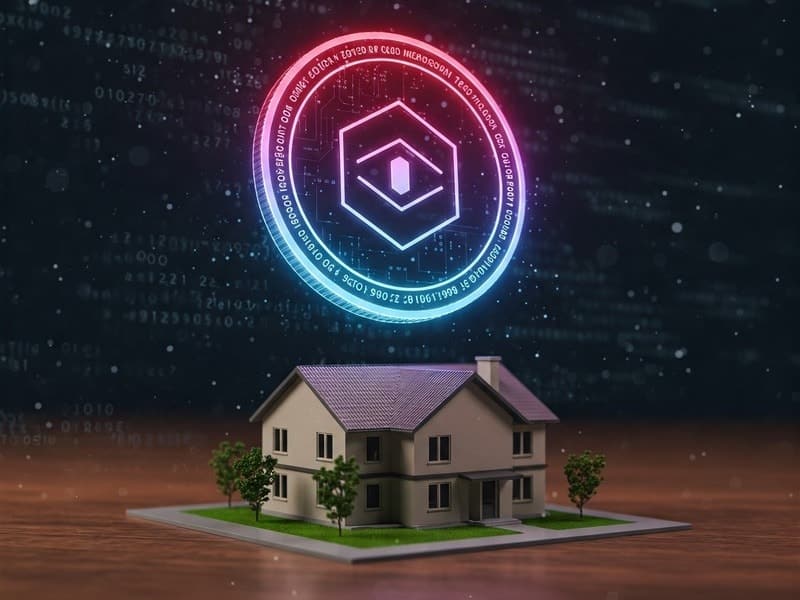
Tokenized assets refer to the digital representation of ownership in physical assets, such as real estate, using blockchain technology. These tokenized assets represent real world assets, like property, that are converted into digital tokens to facilitate fractional ownership and easier trading. This innovative approach allows for the creation of digital tokens that represent fractional ownership in a property, enabling multiple investors to co-own and trade assets with greater ease and efficiency. The Dubai Future Foundation (DFF) and the Dubai Land Department (DLD) have been at the forefront of this initiative, working together to establish a regulatory framework that supports the growth of tokenized assets in the UAE. By leveraging blockchain technology, tokenized assets offer a secure, transparent, and efficient way to manage ownership and transfer of assets, reducing the risks associated with traditional methods, such as fraud and title disputes. Blockchain ensures data transparency by providing immutable and trackable records of ownership and transactions, enhancing security and trust in the system. Security tokens are a type of digital token that confer rights similar to traditional securities, such as shares or bonds, and are subject to regulatory oversight within the tokenization ecosystem.
Introduction to Dubai’s Real Estate Market
Dubai’s real estate market is a thriving and dynamic sector, constantly evolving with a strong focus on innovation and investment. Dubai’s market is projected to reach $16 billion by 2033, significantly bolstered by the Real Estate Tokenization Project. This ambitious initiative aims to contribute over AED 60 billion (approx. $16 billion) to the sector by 2033, aligning with Dubai’s Economic Agenda D33 and Real Estate Strategy 2033. The Dubai Economic Agenda D33 is a strategic plan driving economic growth, innovation, and real estate development, supporting property tokenization and attracting international investors. These strategic plans are designed to establish Dubai as a global hub for innovation and investment in real estate. The Real Estate Tokenization Project is in line with the Dubai Real Estate Sector Strategy 2033, supporting broader objectives for technological advancement and leadership in the sector.
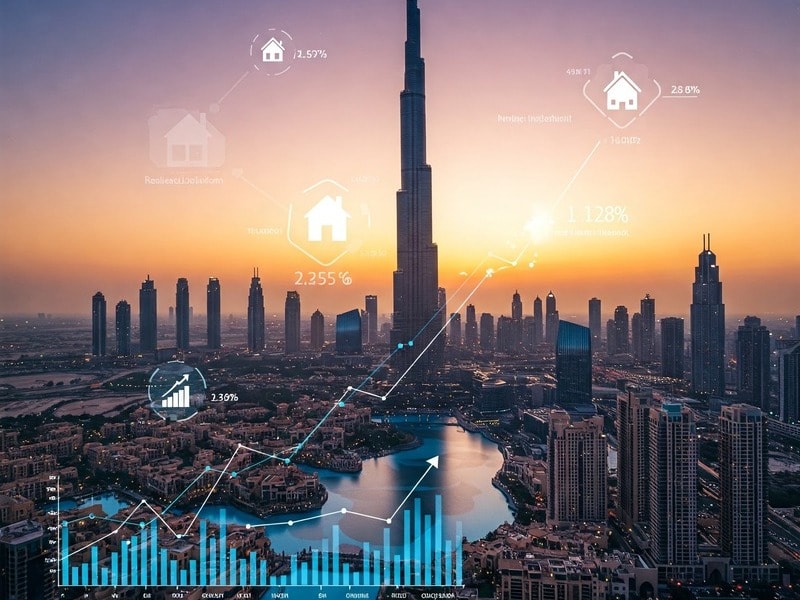
The Dubai Future Foundation (DFF) plays a crucial role in this initiative, providing a robust framework for pilot testing and onboarding qualified startups. This ensures that the regulatory framework is in place to support the market’s growth, making it more accessible and attractive to investors. Dubai’s property market is being transformed by tokenization and innovative investment platforms, which are reshaping traditional real estate investments and driving regional economic growth. Digital transformation is a key driver behind Dubai’s efforts to become a global hub for tokenized real estate, with a focus on adopting blockchain technology and innovative regulatory frameworks. The UAE’s real estate market is also expected to benefit immensely from the tokenization of real estate assets, which will provide greater liquidity and accessibility to a broader range of investors. This innovative approach is set to redefine the market, making it more dynamic and inclusive. Tokenization is expanding access to Dubai’s property market for a broader range of investors, including international participants.
Dubai is Reinventing Real Estate—Again
Dubai, the global symbol of ambition and architectural wonder, is doing it again—this time by leading the blockchain revolution in real estate. As a pioneer in the Middle East, Dubai is setting the standard for blockchain-based real estate tokenization, driving innovation and regional leadership. With the rise of Real Estate NFTs and property tokenization, investors now have a front-row seat to a market evolution that’s democratizing access, boosting transparency, and unlocking fresh liquidity.
The Dubai Blockchain Strategy and the Virtual Assets Regulatory Authority (VARA) are at the forefront of this transformation, working in collaboration with other regulatory and technological agencies to implement groundbreaking changes such as real estate tokenization and blockchain adoption. This approach attracts a significant amount of investment by positioning real estate as a desirable asset class. Additionally, innovative investment models using blockchain technology create new avenues for investment in high-value properties, enhancing liquidity, efficiency, and transparency.
Whether you’re eyeing luxury real estate in Dubai, curious about fractional ownership, or exploring new projects in Dubai, this guide unpacks how NFTs and tokenization are changing the game—and why now is the time to get in. PRYPCO Mint stands out as a leading real estate tokenization platform in the Middle East, recognized for its partnership with the Dubai Land Department and VARA, and its strong regulatory compliance, revolutionizing property investment through blockchain-backed digital ownership and fractional shares.
Why Dubai? The Global Capital of Tokenized Real Estate
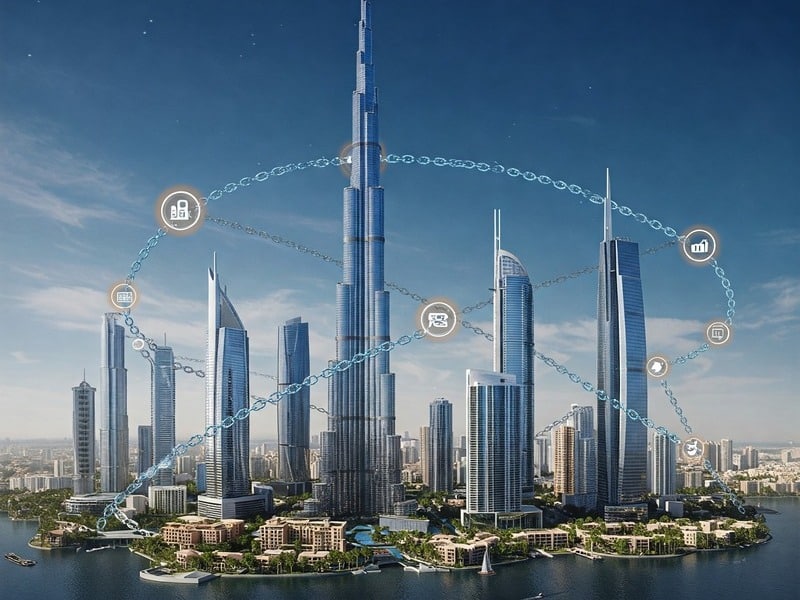
Dubai is not just catching up—it’s setting the pace. Here’s how:
- Government-Backed Innovation: From the Dubai Blockchain Strategy to VARA and DLD pilot programs, the city is rolling out digital-first infrastructure for the future of property.
- Developer Confidence: Top real estate developers in Dubai like DAMAC and MAG are already tokenizing billions in luxury real estate portfolios.
- Legal Sandbox & VARA: UAE’s evolving yet pro-innovation legal frameworks are attracting crypto-savvy investors and global funds.
- Strategic Partnership: Strategic partnerships between tokenization platforms and government authorities, such as the Dubai Land Department and VARA, are driving credibility, innovation, and compliance in the tokenised real estate sector.
Tokenisation is transforming traditional real estate into tokenised real estate, making assets tradable, enabling fractional ownership, and providing access to global markets. This is not just a trend—tokenised real estate represents a fundamental shift in how property ownership and investment are managed in Dubai.
Dubai is becoming the go-to destination for blockchain-based property investments, thanks to its regulatory clarity, infrastructure, and ambition.
Stakeholders must navigate the new opportunities presented by Dubai’s tokenized real estate market to effectively engage with and invest in this innovative landscape.
Benefits of Real Estate NFTs in Dubai
1. Liquidity
Sell your share of a property like stock. No months-long waiting periods. Just tap, sell, reinvest. Traditionally, real estate has been viewed as a fixed and illiquid asset, with investors facing a significant illiquidity premium due to high capital commitments and lengthy transaction processes. Tokenization reduces this illiquidity premium by enabling faster and more efficient trading. With tokenized real estate, investors can conduct secondary transactions with ease, buying and selling tokenized property shares on secondary marketplaces after the initial purchase. This ability to engage in secondary transactions increases liquidity and flexibility for real estate investors.
2. Fractional Ownership
Get exposure to luxury real estate in Dubai—Burj Khalifa views or beachfront villas—for a fraction of the cost. Ownership is divided into smaller units or tokens, allowing multiple investors to purchase fractional ownership stakes in these high-value properties. Tokenization enables investors to purchase fractional shares in multiple properties, enhancing diversification and reducing investment risk. This approach provides access to quality real estate, including premium and well-maintained properties that were previously out of reach for many. Investors can now access quality real estate purely as an investment class, without the need for full ownership. For example, tokenization can facilitate fractional ownership by dividing a property valued at AED 10 million into 10,000 tokens, making it accessible to a broader range of investors.
3. Transparent & Secure
Blockchain means tamper-proof records, no under-the-table dealings, and instant verification.
Additionally, the digitization of property title deeds using blockchain technology is a key component of Dubai’s Real Estate Tokenization Project, enhancing transparency and efficiency in the real estate market. Smart contracts can also automate dividend distribution, ensuring that rental income or profits are efficiently and transparently paid out to token holders. Clearly defined terms in smart contracts regarding tokenized assets, such as the rights associated with ownership, divisional payouts, and compliance with regulatory frameworks, are crucial for ensuring transparency and security.
4. Lower Transaction Costs
Bypassing middlemen with smart contracts reduces brokerage & legal fees, making deals faster and cheaper. Tokenization streamlines traditional investment processes by simplifying and enhancing the buying, selling, and investment mechanisms involved in real estate transactions. This reduction in paperwork, compliance checks, and overall costs makes the entire process more efficient. Additionally, investors can make money through rental income and capital appreciation from properties represented by digital tokens, highlighting the financial benefits of this innovative investment method.
Benefits and Regulations
The benefits of tokenized assets are numerous, including increased market liquidity, improved accessibility, and enhanced transparency. By allowing multiple investors to participate in the ownership of a single asset, tokenization can help to reduce the barriers to entry for small investors and provide a more diversified portfolio of investment opportunities. The regulatory framework for tokenized assets is still evolving, but the Dubai Virtual Assets Regulatory Authority (VARA), in collaboration with the central bank, has taken a proactive approach to providing guidance and oversight, ensuring that the industry operates in a safe and secure manner. Currently, only UAE ID holders and Emirates ID holders are eligible to invest in certain tokenized real estate platforms, and these ID holders must meet specific eligibility criteria as part of the investor onboarding and regulatory compliance process. As the real estate tokenization project continues to gain momentum, it is expected to play a crucial role in shaping the future of the UAE’s real estate market, with the potential to attract new investment and drive economic growth, aligning with the Economic Agenda D33 and the Real Estate Strategy 2033. The initiative is designed to enhance the efficiency and security of real estate transactions, making Dubai’s market more accessible and attractive to investors, and establishing the city as a leader in property technology and innovation.
Investment Opportunities in Dubai’s NFT Real Estate
Dubai’s NFT real estate market offers a plethora of investment opportunities, catering to a diverse range of investors. From fractional ownership of high-end properties to investments in real estate investment trusts (REITs), the market is designed to be inclusive and accessible. The Real Estate Tokenization Project provides a safe and secure way for participants, including developers, tech firms, property management companies, and investors, to buy, sell, and trade digital tokens representing ownership in physical properties. PRYPCO Mint stands out as a pioneering real estate tokenization platform in the Middle East and North Africa, recognized for its partnership with the Dubai Land Department and VARA, and its strong regulatory compliance, revolutionizing property investment through blockchain-backed digital ownership and fractional shares. This innovative project is expected to attract multiple investors, including both individual and institutional investors, offering a new investment model for the real estate sector.
The benefits of investing in Dubai’s NFT real estate market are manifold. Increased liquidity, transparency, and security are just a few of the advantages, along with the potential for higher returns on investment. The market is also expected to be more accessible to small investors, who can invest in smaller portions of properties, allowing for greater diversification and risk management. Unlike traditional crowdfunding, which typically involves investing in a project or development, tokenization allows investors to invest in existing properties, providing a more stable and secure investment opportunity. Unlike crowdfunding, real estate tokenization offers a structured model that enhances investment opportunities in a more organized manner.
The Dubai Land Department (DLD) and the Dubai Virtual Assets Regulatory Authority (VARA) are working collaboratively to establish a clear regulatory framework for the tokenization of real estate assets. This framework is designed to provide greater confidence and trust for investors, ensuring a safe and transparent investment environment. Additionally, the Real Estate Innovation Initiative (REES) is playing a key role in promoting innovation and investment in the real estate sector, driving growth and development in the market. This initiative is expected to further enhance the attractiveness of Dubai’s real estate market, making it a global leader in real estate innovation.
Real-World Examples in Dubai

- DAMAC x Mantra: Tokenizing $1B worth of real estate on-chain—fractional ownership in high-end towers. Digital tokens are issued to multiple investors, enabling fractional ownership and enhancing liquidity in real estate investments. For instance, a hypothetical case might demonstrate how token valuations are calculated, highlighting the practical implications in the tokenization process.
- DLD Tokenization Pilot: Dubai Land Department is testing full integration of NFT-backed title deeds.
- Emaar’s Metaverse Real Estate: Own part of Dubai’s skyline—virtually and physically.
These projects position Dubai as a global NFT property investment leader with the infrastructure to match.
Risks & Challenges to Watch
- Regulatory Uncertainty – Laws are evolving; work with trusted real estate companies in UAE. The tokenization process is managed by approved platforms and regulatory bodies to ensure compliance and governance. The Dubai Land Department continues to refine the Real Estate Tokenization Project by thoroughly assessing the outcomes of the pilot phase and leveraging key insights for enhancements.
- Security & Wallet Risks – Use hardware wallets and audited smart contracts.
- Valuation Volatility – Tokenized real estate still lacks standard valuation models.
- Real-World Integration – Bridging digital tokens with legal property ownership is complex but progressing fast.
The Road Ahead: What to Expect in Dubai

✅ Rise of Real Estate NFT Marketplaces
✅ Deeper integration with the Metaverse
✅ Rapid growth in fractional investing
✅ Entry of institutional capital into tokenized real estate
Dubai is not just participating in the Web3 property revolution—it’s leading it.
Various regulatory bodies and organizations are making collaborative efforts to implement groundbreaking projects like real estate tokenization, enhancing Dubai’s position in the global real estate market. Potential participants can express their interest in these projects by registering through a form, staying informed about the platform’s launch and opportunities within this innovative real estate investment model.
Is property tokenization legal in Dubai?
✔️ It’s gaining legal structure. Dubai is actively piloting and regulating this sector via VARA and DLD.
How do I invest in tokenized properties in Dubai?
✔️ Work with a real estate broker or tokenization platform that partners with trusted developers in Dubai.
Can I buy a flat for sale in Dubai via NFTs?
✔️ Yes. Select platforms offer fractional ownership through NFTs, including luxury flats and off-plan properties in Dubai.
Dubai is Building the Future—Own a Piece of It
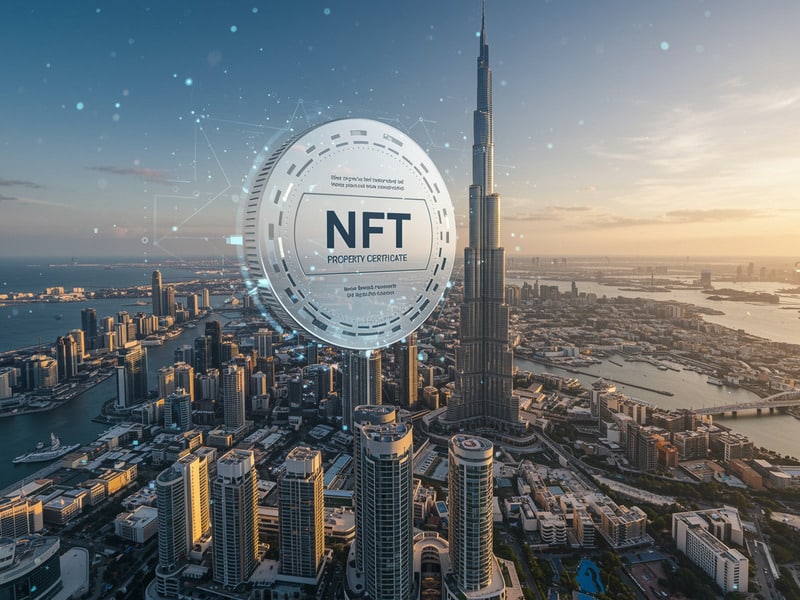
From tokenized luxury towers to metaverse-linked penthouses, Dubai is becoming the epicenter of digital real estate investing.
Whether you’re looking for Dubai investment properties, exploring new projects in Dubai, or ready to engage with top real estate companies in the UAE, this is your chance to invest in the next chapter of property ownership. Real estate tokenization transforms investment opportunities for clients, including investors, brokers, and everyday buyers, by offering fractional ownership and lower barriers to entry. The success of these initiatives relies on the collaborative efforts of multiple stakeholders, including tech firms, investors, and regulatory authorities, to foster transparency, governance, and innovation in the property market.
FAQ’s
1. What is real estate tokenization in Dubai?
Real estate tokenization in Dubai is the process of converting property ownership into digital tokens on a blockchain. Each token represents a fraction of ownership, making real estate more liquid and accessible to investors. Regulated by the Dubai Land Department and VARA, tokenized assets allow secure, transparent, and efficient property transactions.
2. Is real estate tokenization legal in Dubai?
Yes, tokenization is legal in Dubai under the Dubai Land Department (DLD) and Virtual Assets Regulatory Authority (VARA). The UAE has introduced pilot projects and a regulatory framework that provides investor protection, ensuring fractional ownership of tokenized real estate is compliant with international standards.
3. How do I invest in tokenized properties in Dubai?
To invest in tokenized real estate in Dubai:
- Choose a licensed real estate company or approved blockchain platform.
- Select a tokenized property (villa, apartment, or commercial).
- Purchase digital tokens that represent fractional ownership.
- Trade, hold, or sell tokens for rental income or capital appreciation.
4. What are the benefits of real estate NFTs in Dubai?
The benefits of Dubai’s real estate NFTs include:
- Liquidity through easy buying/selling of property shares.
- Fractional ownership of high-value assets.
- Tamper-proof, transparent blockchain records.
- Lower transaction costs by reducing intermediaries.
5. Can I buy luxury apartments in Dubai through NFTs?
Yes. Tokenized real estate platforms allow investors to buy fractional shares of luxury properties such as Burj Khalifa apartments, Palm Jumeirah villas, and Downtown Dubai flats. NFTs enable global buyers to access premium real estate without paying the full property price upfront.
6. What are the risks of investing in tokenized property in Dubai?
The main risks include regulatory uncertainty, valuation volatility, cybersecurity threats to digital wallets, and challenges in linking NFTs with legal title deeds. To reduce risks, work with licensed brokers, use hardware wallets, and choose platforms approved by Dubai’s VARA and DLD.
7. How much of Dubai’s real estate will be tokenized by 2033?
By 2033, tokenized real estate in Dubai is projected to account for nearly 7% of all property transactions, contributing approximately AED 60 billion ($16 billion) to the real estate sector. This growth is aligned with Dubai’s Real Estate Strategy 2033.
8. Can expats invest in tokenized properties in Dubai?
Yes, expats can fully invest in tokenized Dubai real estate. With 100% foreign ownership in freehold zones, international buyers can purchase fractional ownership tokens in luxury and off-plan properties. Dubai’s Golden Visa further attracts long-term investors.
9. How does fractional ownership work in Dubai real estate NFTs?
Fractional ownership divides a property into multiple digital tokens. For example, a villa worth AED 10 million can be split into 10,000 tokens, each representing 0.01% ownership. Investors can buy and sell tokens freely, earning rental income and capital appreciation proportional to their share.
10. Which developers in Dubai are offering tokenized real estate?
Leading Dubai developers like DAMAC, MAG, and Emaar are exploring tokenization. DAMAC recently partnered with blockchain firms to tokenize $1B worth of real estate, while the Dubai Land Department has launched pilot programs for NFT-backed title deeds.
11. What role does VARA play in Dubai’s real estate tokenization?
The Virtual Assets Regulatory Authority (VARA) regulates all blockchain-based assets, including tokenized real estate. VARA ensures compliance, protects investors, and establishes a legal framework for property tokenization, making Dubai a safe and trusted hub for digital property investments.
12. Will tokenization increase Dubai property values?
Yes. Tokenization is expected to increase property values by enhancing liquidity, attracting new investor classes, and making high-value real estate accessible to smaller investors. As blockchain adoption grows, demand for tokenized assets will likely boost Dubai’s real estate ROI.
Contact Splendor.ae to learn how you can get started with Real Estate NFTs and Tokenized Properties in Dubai.

